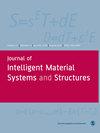Modeling and design of magnetorheological elastomer isolator system for an active control solution to reduce the vibration transmission in elevator context
IF 2.2
3区 材料科学
Q3 MATERIALS SCIENCE, MULTIDISCIPLINARY
Journal of Intelligent Material Systems and Structures
Pub Date : 2023-08-05
DOI:10.1177/1045389x231188608
引用次数: 0
Abstract
The attenuation of the structure-borne sound caused by elevator systems in residential buildings is a priority for manufacturers. This work develops a model of an active control isolation system for the vibrations produced by the elevator drive machine. This solution proposes the substitution of conventional passive isolators by new ones made of a magnetorheological elastomer (MRE), a smart material whose modulus can be modified by applying a magnetic field. To guide the design process, MRE isolators are fabricated and experimentally tested statically and dynamically in compression mode. Subsequently, the parameters of the MRE are fitted to build a nonlinear material sub-model that accounts for the frequency, amplitude, and magnetic field dependency. Afterward, a global model of the elevator drive machine vibration isolation system is developed, which incorporates the drive machine, structure, and MRE-based isolator. To enhance vibration isolation, two active control strategies are designed and assessed. Simulation results predict that active control systems based on MRE isolators improve vibration isolation as compared to traditional passive systems. The excitation amplitude and frequency, along with the control strategy and magnetization of the MRE isolators are shown to be critical parameters when designing an active control solution.基于主动控制方案的磁流变弹性体隔振系统建模与设计
住宅建筑中电梯系统引起的结构声衰减是制造商优先考虑的问题。本工作建立了一个主动控制隔离系统的模型,用于电梯驱动机器产生的振动。该方案提出用磁流变弹性体(MRE)制成的新型隔离器取代传统的被动隔离器,磁流变弹性体是一种智能材料,其模量可以通过施加磁场来改变。为了指导设计过程,制作了MRE隔振器,并在压缩模式下进行了静态和动态试验。随后,对MRE参数进行拟合,建立考虑频率、幅值和磁场依赖关系的非线性材料子模型。然后,建立了包含驱动机构、结构和基于mre的隔振器的电梯驱动机隔振系统全局模型。为了提高隔振性能,设计并评估了两种主动控制策略。仿真结果表明,与传统的被动控制系统相比,基于MRE隔振器的主动控制系统具有更好的隔振性能。在设计主动控制方案时,励磁幅值和频率、控制策略和磁隔离器的磁化强度是关键参数。
本文章由计算机程序翻译,如有差异,请以英文原文为准。
求助全文
约1分钟内获得全文
求助全文
来源期刊
CiteScore
5.40
自引率
11.10%
发文量
126
审稿时长
4.7 months
期刊介绍:
The Journal of Intelligent Materials Systems and Structures is an international peer-reviewed journal that publishes the highest quality original research reporting the results of experimental or theoretical work on any aspect of intelligent materials systems and/or structures research also called smart structure, smart materials, active materials, adaptive structures and adaptive materials.

 求助内容:
求助内容: 应助结果提醒方式:
应助结果提醒方式:


